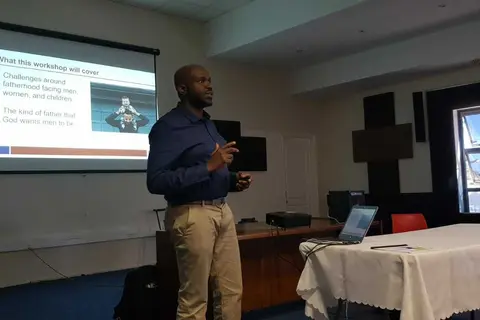Crossing cultures led to ministering in diversity
NewsPastor Cobus van Schalkwyk (38) believes the church where he serves, Cross Culture City Church in the south of Johannesburg is, in some ways a reflection of Heaven as described in the book of Revelation 7:9 “After this I looked, and there before me was a great multitude that no one could count, from every nation, tribe, people and language, standing before the throne and before the Lamb. They were wearing white robes and were holding palm branches in their hands…”
“That’s what I see when I stand in the pulpit on a Sunday morning. We have a congregation of people from Namibia, Botswana, Mozambique, Zambia, Zimbabwe, Congo, Nigeria, Germany, China, Croatia and India (Just to name a few). We also have isiZulu, isiXhosa, Sesotho, English and Afrikaans speaking people,” he says. It is beautiful to see everyone together in one place worship God.
The church took part in a six week What’s Your Story? church mobilisation programme, uniting its congregants from diverse backgrounds, bringing about peace and understanding.
“We had the opportunity to watch the film Beyond the River which resonated with many of our members and the story sharing process was an incredible opportunity to break barriers and challenge stereotypes,” he says
“The roll-out process at the church also included five evening sessions where small groups discussed various topics highlighted by short video clips (Laid out in the manual). There were various exercises to guide members in story sharing as well as scripture readings found in the resources provided by Heartlines. On the final evening we recapped the experience and received a lot of positive feedback.”
Cobus says one of the stories that resonated with him came from a white woman who described what happened after her father died unexpectedly of a heart attack.
“In western culture when someone dies, we bid farewell and expect the family to move on quickly. Mourning is not an elaborate process and at times failure to mourn properly can cause issues such as depression,” he says.
“What really resonated with me was that black South African colleagues of her father came to visit the family on the night of the funeral and provided incredible support. They brought food, cooked and mourned giving the wife and daughter an opportunity to grieve and cry in a way that is not common in western culture,” he adds.
The process brought healing and was a life-changing experience for the family.
The meeting of cultures is something that has impacted Cobus throughout his life.
“I grew up in an Afrikaans home on a farm outside of Bloemfontein, in the Free State. My grandparents and parents were very rigid and enforced their beliefs about white supremacy and supported apartheid,” he says.
He admits that in school, he was part of a group of bullies that treated black learners in a discriminatory fashion.
“In 1996 our school became integrated and the doors were opened to black learners. I am ashamed of being one of the white learners who treated them in a poor manner,” he adds.
It was when he became a born-again Christian that his perspective started to change.
“I was saved as a teenager and realised that racism was against God’s will,” he says. “I heard God’s voice speaking to me, and not in an imaginative way, God told me clearly that He wanted me to become a shepherd to His people and that He would give me a multiracial ministry. As you can imagine for someone with my background, it was daunting.”
Towards the end of high school, he starting modelling a new behaviour and lost a few friends along the way.
“Sports at our school was segregated with white learners playing cricket and rugby and black learners playing basketball and soccer,” he says.
“I joined the basketball team because I’m very tall and it was interesting to me. This became a cause for controversy on both ends for black and white learners, but I enjoyed the sport because I was very good at it, and it’s true of our nation that sport brings people together.”
In 2001, Cobus joined full-time ministry and attended his first missions trip to Zambia.
“It was the most life-changing encounter. I truly encountered God’s love through the people of Zambia. They loved me unconditionally and broke every barrier in my mind and turned my world upside down,” he says.
“We were a small group of white people and I thought that I was going to Zambia to minister to the people, instead they ministered to me. I believe that only the Holy Spirit can set you free from a spirit of racism. I started to see people through God’s eyes and I was never the same after that experience.”
He went on to become a pastor at Living Waters Christian Church in Sabie, Mpumalanga, where he held the position for seven years. (Alongside Senior Pastor Phil Robson) In 2012 he joined Cross Culture Christian Church where he ministers today. (Alongside Senior Pastor Don Turvey)
Cobus believes the What’s Your Story? campaign is essential for uniting the people of his church. The congregation continues to grow in diversity and numbers.
“It’s easy to stereotype and when people share their stories about what they experience on a regular basis, instead of talking about sports and weather, it deepens our relationships. I enjoy being a shepherd to God’s people at such a diverse church,” he says. “I’ve learnt that because God loved me first, I can love myself and others. Without love I am nothing, because God is love after all.”
The WYS? Project was made possible through the support of a grant from Templeton Religion Trust. The opinions expressed in this publication are those of the authors and do not necessarily reflect the views of Templeton Religion Trust.

Heartlines
At Heartlines, the Centre for Values Promotion, we believe in the power of story and positive values to touch hearts and transform behaviour.
Featured
